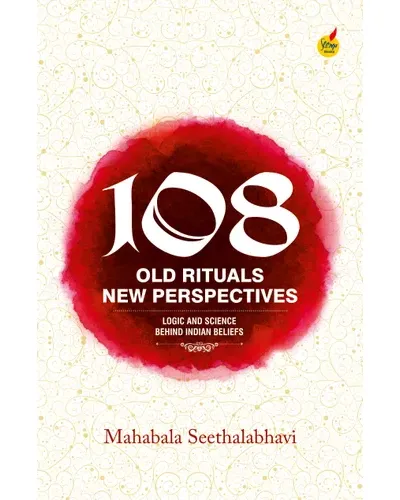
Product Code - P45294
108 Old Rituals New Perspectives (Logic & Science Behind Beliefs)
Quantity
Product Description
Belief or blind belief? Science or logic?
There is no harm in having beliefs. But blind beliefs are dangerous. Science proves any subject with evidence to back it, but logic gives proof for the subject based on our own experience. There is affection in old wives tales, which is why the children believe them with closed eyes. But, the same children question the elders and look for logic when they grow up.
It is amazing that there is belief, blind belief, science, logic and old wives tales in our religious rituals, customs and traditions. More than anything else, these customs deeply influence our lives. It is a part of community living. This is why a religious person shows tolerance when somebody scolds him; but he gets into a rage when somebody talks ill of his God or makes fun of his beliefs.
Religion is based on beliefs. It is not just the Hindu religion; all the religions of the world are based on beliefs. No religion was created with the help of Science. Religions were created because of the necessity to face the realities of life. Blind beliefs, science, logic, old wives tales were added on later. Wise people retain the beliefs and try to obliterate the blind beliefs. But the problem is the thin line between beliefs and blind beliefs. Sometimes this line is evident, sometimes it is not. Some people view it in one way while others see it differently. Thus what is belief for some becomes blind belief to some others. If a religious person says that worshipping God is his belief, a progressive person might argue that it is a blind belief.
Occasionally, between beliefs and blind beliefs, our traditions and customs become the sacrificial goat. Even if they are good. Even if they do not cause damage to anybody.
When you go to a temple, you ring the bell. Why do you ring the bell? You do pradakshina around the garbha gudi. Why do you do it? If you do namaskara to elders, why do they touch your head and bless you? If you sweep the house in the evening, your grandmother will scold you. What is the reason? Why do the priests say that the main door of a house should face north or east? Why do you drink teertha after the pooja? It is said that there should be a tulasi plant in front of every house. What is the background for this? Do you think that all these are blind beliefs? Definitely they are not. There are scientific and logical reasons for all these beliefs. There is logic behind every tradition and belief. Some of them evoke surprise, some others are mysterious. The intention of this book is to bring out the logic behind the religious beliefs.
Consider for example, orthodox Hindus do not dine at a table. They sit on a mat spread on the floor or on a wooden plank to eat. Anna (food) is Brahma. Religion tells us that we should eat in this manner to show our respect to food. Is this all there is to it? No. There is a scientific reason for this. When we sit on the floor to eat, we have to bend to take the food from the plate and also to put it in our mouths. When we bend, the upper part of the waist and the lower part of the stomach fold. This prevents us from eating till the stomach is completely full. When the stomach is near full, we feel full and stop eating. This prevents the accumulation of fat in our body. It also helps in the proper digestion of food. Our overall health becomes good! This is the thought behind this religious belief.
Let us consider another example. Orthodox villagers snap their fingers in front of their mouths whenever they yawn. If you ask them why they do so, they say that the evil forces will be destroyed when we snap our fingers in front of the mouth when we yawn. There is a curious reason for this practice. What is that? When the body is very tired or the mind is very depressed, our activity is slightly affected. Then we don’t breathe deeply. Therefore the body does not get enough oxygen. The process of throwing carbon dioxide out of the system and absorbing Oxygen into the blood does not take place properly. The air that we take in through our nostrils becomes insufficient. We open the mouth widely so that more oxygen is taken into the body. Snapping our fingers helps us to overcome these deficiencies to some extent. Because when we snap our fingers we use our thumb and middle finger. This is called akasha mudra in Yoga Shastra. This mudra energises the digestive system. More energy is produced and the body becomes energetic. The akasha mudra also helps in removing toxic substances that accumulate in the body. The lethargy that results from eating too much is also overcome by this mudra. When children yawn, sometimes the jaws get displaced; the akasha mudra or snapping fingers helps in preventing this.
There are many scientific and logical reasons for all our religious beliefs. Why did our elders not give us these reasons? Why did they allude to religion as the reason for everything? Why did they say that God will bless us or make us suffer for the things we do? They said so because we all have the fear of God. The ancient people feared God more than we do. They believed in God. They would do anything mentioned in the name of God. If God forbade something, they would not do it at all. Therefore they brought in God’s name to every custom. There is also another reason. How many people will listen if you tell them that, scientifically, you should not eat too much meat, which will lead to accumulation of fat and ill health? Instead they spread the belief that it would be a sacrilege if we ate meat on Mondays, Thursdays and during the Hindu month of Shravana. This is followed by many non-vegetarians! The gist of it all is that most people will not listen if you tell them anything scientific, logical or good in a straightforward manner. If you say that God will be pleased or that God will be angry, most people will pay attention to what you say! Is there a better way to inculcate good healthy habits in children? They don’t listen to what the elders say in the first place. That is why our ancestors attached God’s name to all good practices, which were referred to as religious customs. The truth behind all these beliefs is unfolded in this book.
Your logic may be opposite to or different from what has been discussed in this book. You may also have a difference of opinion about the scientific reasons given here. The intention here is to look for the positive aspects in tradition. It is important that we understand the overall results of traditional practices. It is enough if we become aware that our beliefs and traditions are not mere customs; their intention is our well-being.
Author
Mahabala Seethalabhavi
Binding
Soft Bound
Number of Pages
124
Publisher
Seema Books
ISBN-13
9788193639931
Publication Year
2024
Height
10 CMS
Length
10 CMS
Weight
200 GMS
Width
1 CMS
Language
Kannada




